UNITED NATIONS: Be realistic. Show patience. Engage. And above all, don’t isolate. Those are the pillars of an approach emerging in Pakistan to deal with the fledgling government that is suddenly running the country next door once again — Afghanistan’s resurgent, often-volatile Taliban.
Pakistan’s government is proposing that the international community develop a road map that leads to diplomatic recognition of the Taliban — with incentives if they fulfill its requirements — and then sit down face to face and talk it out with the militia’s leaders.
Pakistani Foreign Minister Shah Mehmood Qureshi outlined the idea Wednesday in an interview with The Associated Press on the sidelines of the UN General Assembly’s meeting of world leaders.
“If they live up to those expectations, they would make it easier for themselves, they will get acceptability, which is required for recognition,” Qureshi told the AP. “At the same time, the international community has to realize: What’s the alternative? What are the options? This is the reality, and can they turn away from this reality?”
He said Pakistan “is in sync with the international community” in wanting to see a peaceful, stable Afghanistan with no space for terrorist elements to increase their foothold, and for the Taliban to ensure “that Afghan soil is never used again against any country.”
“But we are saying, be more realistic in your approach,” Qureshi said. “Try an innovative way of engaging with them. The way that they were being dealt with has not worked.”
Expectations from the Taliban leadership could include an inclusive government and assurances for human rights, especially for women and girls, Qureshi said. In turn, he said, the Afghan government might be motivated by receiving development, economic and reconstruction aid to help recover from decades of war.
He urged the United States, the International Monetary Fund and other countries that have frozen Afghan government funds to immediately release the money so it can be used “for promoting normalcy in Afghanistan.” And he pledged that Pakistan is ready to play a “constructive, positive” role in opening communications channels with the Taliban because it, too, benefits from peace and stability.
This is the second time that the Taliban, who adhere to a strict version of Islam, have ruled Afghanistan. The first time, from 1996 to 2001, ended when they were ousted by a US-led coalition after the 9/11 attacks, which were directed by Osama bin Laden from Afghanistan.
During that rule, Taliban leaders and police barred girls from school and prohibited women from working outside the home or leaving it without a male escort. After they were overthrown, Afghan women still faced challenges in the male-dominated society but increasingly stepped into powerful positions in government and numerous fields.
But when the US withdrew its military from Afghanistan last month, the government collapsed and a new generation of the Taliban resurged, taking over almost immediately. In the weeks since, many countries have expressed disappointment that the Taliban’s interim government is not inclusive as its spokesman had promised.
While the new government has allowed young girls to attend school, it has not yet allowed older girls to return to secondary school, and most women to return to work despite a promise in April that women “can serve their society in the education, business, health and social fields while maintaining correct Islamic hijab.”
Pakistan, which shares a long border with Afghanistan, has a long and sometimes conflicted relationship with its neighbor that includes attempts to prevent terrorism there and, some say, also encouraging it, which Islamabad denies. The Islamabad government has a fundamental vested interest in ensuring that whatever the new Afghanistan offers, it is not a threat to Pakistan.
That, Qureshi says, requires a steady and calibrated approach.
“It has to be a realistic assessment, a pragmatic view on both sides, and that will set the tone for recognition eventually,” the Pakistani minister said. The good news, he said: The Taliban are listening, “and they are not insensitive to what is being said by neighbors and the international community.”
How does he know they’re listening? He says the interim government, drawn mostly from Afghanistan’s dominant Pashtun ethnic group, made some additions on Tuesday. It added representatives from the country’s ethnic minorities — Tajiks, Uzbeks and Hazaras, who are Shiite Muslims in the majority Sunni Muslim country.
“Yes, there are no women yet,” Qureshi said. “But let us let the situation evolve.”
He stressed that the Taliban must make decisions in coming days and weeks that will enhance their acceptability.
“What the international community can do, in my view, is sit together and work out a roadmap,” Qureshi said. “And if they fulfill those expectations, this is what the international community can do to help them stabilize their economy. This is the humanitarian assistance that can be provided. This is how they can help rebuild Afghanistan, reconstruction and so on and so forth.”
He added: “With this roadmap ahead, I think an international engagement can be more productive.”
On Wednesday night, UN Secretary-General Antonio Guterres said after a meeting of the five permanent members of the UN Security Council that all five nations — the United States, China, Britain, Russia and France — want “an Afghanistan at peace, stable, where humanitarian aid can be distributed without problems or discrimination.”
He also described a hoped-for “Afghanistan where the rights of women and girls are respected, an Afghanistan that won’t be a sanctuary for terrorism, an Afghanistan where we have an inclusive government representing the different sectors of the population.”
Qureshi said there are different forums where the international community can work out the best way to approach the situation. In the meantime, he asserted, things seem to be stabilizing. Less than six weeks after the Taliban seized power on Aug. 15, he said, Pakistan has received information that the law-and-order situation has improved, fighting has stopped and many internally displaced Afghans are going home.
“That’s a positive sign,” Qureshi said.
He said Pakistan hasn’t seen a new influx of Afghan refugees — a sensitive issue for Pakistanis, who are highly motivated to prevent it. A humanitarian crisis, a foundering economy and workers who return to jobs and school but aren’t getting salaries and don’t have money could cause Afghans to flee across the porous border into Pakistan, which has suffered economically from such arrivals over decades of conflict.
Qureshi prescribed patience and realism. After all, he says, every previous attempt to stabilize Afghanistan has failed, so don’t expect new efforts to produce immediate success with the Taliban. If the United States and its allies “could not convince them or eliminate them in two decades, how will you do it in the next two months or the next two years?” he wondered.
Asked whether he had a prediction of what Afghanistan might be like in six months, Qureshi turned the question back on his AP interviewer, replying: “Can you guarantee me US behavior over the next six months?”
Pakistan says international community can’t ‘turn away’ from reality of Afghan Taliban
https://arab.news/p7z7v
Pakistan says international community can’t ‘turn away’ from reality of Afghan Taliban
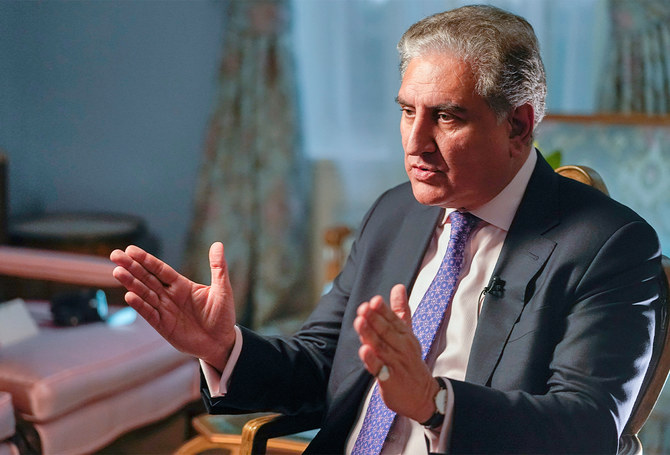
- Pakistan’s government is proposing global powers develop a road map that leads to diplomatic recognition of Taliban
- Expectations from Taliban include an inclusive government and assurances for human rights, especially for women and girls
Analysts hail Saudi FM’s ‘significant’ visit, say investments will boost Pakistan’s economy
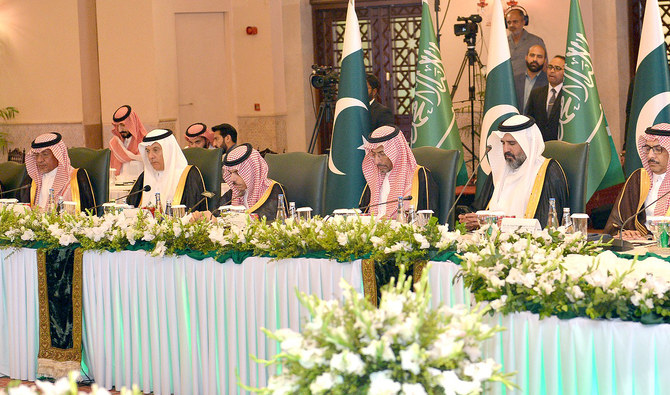
- Saudi Arabia’s foreign minister visited Pakistan this week to discuss investments and enhance bilateral economic cooperation
- Former diplomat says Saudi investments could increase to $25 billion if Pakistan provides conducive environment to Saudi investors
ISLAMABAD: Former Pakistani diplomats and analysts on Wednesday hailed Saudi Foreign Minister Faisal bin Farhan Al Saud’s “significant” visit to Pakistan, saying that investment agreements reached between the two sides could lead to the creation of thousands of jobs in the South Asian country and boost its economic prospects.
Prince Faisal bin Farhan arrived in Islamabad on a two-day official visit on Monday. The minister led a high-powered delegation to Islamabad with his visit aimed at enhancing bilateral economic cooperation and pushing forward previously agreed investment deals.
His trip came a little over a week after Crown Prince Mohammed bin Salman met Prime Minister Shehbaz Sharif in Makkah and reaffirmed the Kingdom’s commitment to expedite investments worth $5 billion.
Pakistan and Saudi Arabia enjoy strong trade, defense and cultural ties. The Kingdom is home to over 2.7 million Pakistani expatriates and the top source of remittances to the cash-strapped South Asian country.
“Pakistan has longstanding ties with Saudi Arabia but now it has taken a new dimension of economic cooperation,” Zahid Hussain, a senior journalist and political analyst, told Arab News.
“And that’s why this visit was very significant.”
Hussain said the Saudi foreign minister’s visit had turned out to be a “very productive” one as both sides held discussions on investment opportunities that he said Pakistan could offer to Saudi businessmen.
“They have discussed various opportunities which are beneficial for Saudis for investment and that could be said as the turning point in the Pakistan and Saudi relationship,” Hussain added.
During his two-day official trip, the Saudi foreign minister held meetings with top civilian and military leadership including Prime Minister Shehbaz Sharif and army chief General Syed Asim Munir. The Saudi delegation was also briefed by the Special Investment Facilitation Council (SIFC), a key government body set up in June 2023 to fast-track decisions related to international investment in Pakistan’s key sectors IT, mining, energy and agriculture.
Speaking at a joint press conference in Islamabad on Tuesday along with his counterpart Ishaq Dar, Prince Faisal said there was a “significant opportunity” for the Kingdom to increase its investments in Pakistan.
Former diplomat Javed Hafeez said potential Saudi investments will enhance Pakistan’s exports and lead to the creation of thousands of new jobs for Pakistani professionals in the energy, mining, agriculture, and other sectors.
“This would have an overall positive effect on other sectors as well and on Pakistan’s economy,” he noted.
Hafeez said the Kingdom’s investments in Pakistan could increase to the tune of $25 billion from initial investments of $5 billion, provided Islamabad succeeds in ensuring a conducive environment for Saudi investors.
“I see it [initial investments of $5 billion] as a test case,” Hafeez said. “If we can provide the foolproof security [to Saudi investors] and if these projects are successful, then of course much more investment will come.”
‘Suffs’ musical with Malala, Hillary as producers has timing on its side
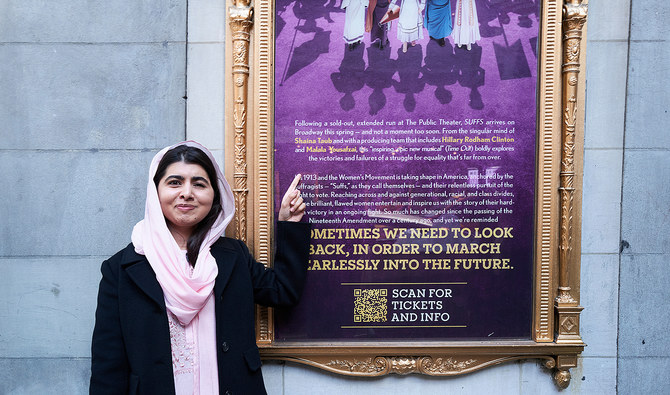
- ‘Suffs’ is a Broadway musical that focuses on the American women’s suffrage movement
- Pakistani Nobel laureate says musical helped her see her activism from a “new lens“
NEW YORK: Shaina Taub was in the audience at “Suffs,” her buzzy and timely new musical about women’s suffrage, when she spied something that delighted her.
It was intermission, and Taub, both creator and star, had been watching her understudy perform at a matinee preview last week. Suddenly, she saw audience members searching the Wikipedia pages of key figures portrayed in the show: women like Ida B. Wells, Inez Milholland and Alice Paul, who not only spearheaded the suffrage fight but also wrote the Equal Rights Amendment ( still not law, but that’s a whole other story).
“I was like, that’s my goal, exactly that!” Taub, who plays Paul, said from her dressing room later. “Do everything I can to make you fall in love with these women, root for them, care about them. So that was a really satisfying moment to witness.”
Satisfying but sobering, too. Fact is, few audience members know much about the American suffrage movement. So the all-female creative team behind “Suffs,” which had a high-profile off-Broadway run and opens Thursday on Broadway with extensive revisions, knows they’re starting from zero.
It’s an opportunity, says Taub, who studied social movements — but not suffrage — at New York University. But it’s also a huge challenge: How do you educate but also entertain?
One member of the “Suffs” team has an especially poignant connection to the material. That would be producer Hillary Clinton.
She was, of course, the first woman to win the US presidential nomination of a major party, and the first to win the popular vote. But Clinton says she never studied the suffrage movement in school, even at Wellesley. Only later in life did she fill in the gap, including a visit as first lady to Seneca Falls, home to the first American women’s rights convention some 70 years before the 19th Amendment gave women the vote.
“I became very interested in women’s history through my own work, and writing and reading,” Clinton told The Associated Press. And so, seeing “Suffs” off-Broadway, “I was thrilled because it just helps to fill a big gap in our awareness of the long, many-decades struggle for suffrage.”
It was Taub who wrote Clinton, asking her to come on board. “I thought about it for a nanosecond,” Clinton says, “and decided absolutely, I wanted to help lift up this production.” A known theater lover, Clinton describes traveling often to New York as a college student and angling for discounts, often seeing only the second act, when she could get in for free. “For years, I’d only seen the second act of ‘Hair,’” she quips.
Clinton then reached out to Malala Yousafzai, whom Taub also hoped to engage as a producer. As secretary of state, Clinton had gotten to know the Pakistani education activist who was shot by a Taliban gunman at age 15. Clinton wanted Yousafzai to know she was involved and hoped the Nobel Peace Prize winner would be, too.
“I’m thrilled,” Clinton says of Yousafzai’s involvement, “because yes, this is an American story, but the pushback against women’s rights going on at this moment in history is global.”
Yousafzai had also seen the show, directed by Leigh Silverman, and loved it. She, too, has been a longtime fan of musicals, though she notes her own acting career began and ended with a school skit in Pakistan, playing a not-very-nice male boss. Her own education about suffrage was limited to “one or two pages in a history book that talked about the suffrage movement in the UK,” where she’d moved for medical treatment.
“I still had no idea about the US side of the story,” Yousafzai told the AP. It was a struggle among conflicting personalities, and a clash over priorities between older and younger activists but also between white suffragists and those of color — something the show addresses with the searing “Wait My Turn,” sung by Nikki M. James as Wells, the Black activist and journalist.
“This musical has really helped me see activism from a different lens,” says Yousafzai. “I was able to take a deep breath and realize that yes, we’re all humans and it requires resilience and determination, conversation, open-mindedness … and along the way you need to show you’re listening to the right perspectives and including everyone in your activism.”
When asked for feedback by the “Suffs” team, Yousafzai says she replied that she loved the show just as it was. (She recently paid a visit to the cast, and toured backstage.) Clinton, who has attended rehearsals, quips: “I sent notes, because I was told that’s what producers do.”
Clinton adds: “I love the changes. It takes a lot of work to get the storytelling right — to decide what should be sung versus spoken, how to make sure it’s not just telling a piece of history, but is entertaining.”
Indeed, the off-Broadway version was criticized by some as feeling too much like a history lesson. The new version feels faster and lighter, with a greater emphasis on humor — even in a show that details hunger strikes and forced feedings.
One moment where the humor shines through: a new song titled “Great American Bitch” that begins with a suffragist noting a man had called her, well, a bitch. The song reclaims the word with joy and laughter. Taub says this moment — and another where an effigy of President Woodrow Wilson (played by Grace McLean, in a cast that’s all female or nonbinary) is burned — has been a hit with audiences.
“As much as the show has changed,” she says, “the spine of it is the same. A lot of what I got rid of was just like clearing brush.”
Most of the original cast has returned. Jenn Colella plays Carrie Chapman Catt, an old-guard suffragist who clashed with the younger Paul over tactics and timing. James returns as Wells, while Milholland, played by Phillipa Soo off-Broadway, is now played by Hannah Cruz.
Given its parallels to a certain Lin-Manuel Miranda blockbuster about the Founding Fathers, it’s perhaps not a surprise that the show has been dubbed “Hermilton” by some.
“I have to say,” Clinton says of Taub, “I think she’s doing for this part of American history what Lin did for our founders — making it alive, approachable, understandable. I’m hoping ‘Suffs’ has the same impact ‘Hamilton’ had.”
That may seem a tall order, but producers have been buoyed by audience reaction. “They’re laughing even more than we thought they would at the parts we think are funny, and cheering at other parts,” Clinton says.
A particular cheer comes at the end, when Paul proposes the ERA.
“A cast member said, ‘Who’d have ever thought the Equal Rights Amendment would get cheers in a Broadway theater?’” Clinton recalls.
One clear advantage the show surely has: timeliness. During the off-Broadway run, news emerged the Supreme Court was preparing to overturn Roe vs. Wade, fueling a palpable sense of urgency in the audience. The Broadway run begins as abortion rights are again in the news — and a key issue in the presidential election only months away.
Taub takes the long view. She’s been working on the show for a decade, and says something’s always happening to make it timely.
“I think,” she muses, “it just shows the time is always right to learn about women’s history.”
Pakistan Army says seven militants trying to infiltrate border from Afghanistan killed
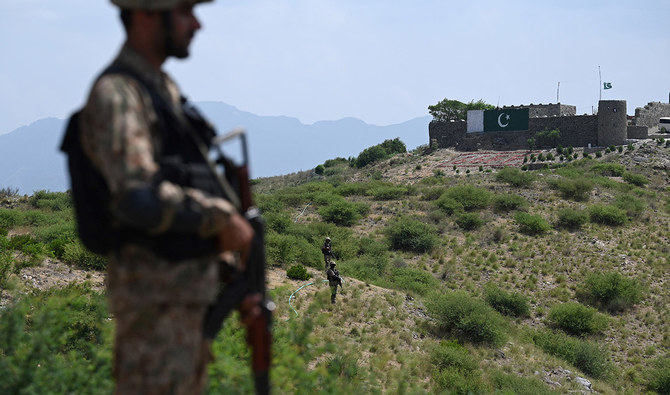
- Large quantity of weapons, ammunition and explosives were seized from the slain “terrorists,” says army
- Urges Afghanistan to deny the use of its soil to “terrorists” for carrying out attacks against Pakistan
ISLAMABAD: Pakistan Army said on Wednesday that seven militants attempting to infiltrate the Pakistan-Afghanistan border from the neighboring country a day earlier had been killed, urging Kabul to effectively manage its border and deny the use of its soil to “terrorists.”
The Inter-Services Public Relations (ISPR) said seven “terrorists” attempting to infiltrate the Pakistan-Afghanistan border were detected by security forces in the Spinkai area of North Waziristan on Tuesday.
“The infiltrators were surrounded, effectively engaged and after an intense fire exchange, all seven terrorists were sent to hell,” the ISPR said.
“A large quantity of weapons, ammunition and explosives was also recovered from the killed terrorists.”
The army said Pakistan has consistently been asking the Afghan government to ensure effective border management on their side of the border.
“Interim Afghan Government is expected to fulfill its obligations and deny the use of Afghan soil by terrorists for perpetuating acts of terrorism against Pakistan,” the army’s media wing said.
It said Pakistan’s security forces are committed to securing its borders and eliminating militancy from the country.
Pakistan and Afghanistan have traded blame in recent months over who is responsible for a recent spate of militant attacks in Pakistan. Islamabad says the attacks are launched mostly from safe havens in Afghanistan. Kabul’s ruling Taliban deny this and blame Islamabad for not being able to handle its own security challenges.
Tensions skyrocketed when last month Pakistan conducted airstrikes in Afghanistan’s Khost and Paktika provinces against what it said were militant targets. The Afghan Taliban said the strikes killed eight, all of them women and children, prompting them to fire heavy weapons at Pakistani forces along the border.
Relations between the two countries had taken a hit earlier in November 2023 when Pakistan kicked off a deportation drive that has seen around half a million so-called undocumented Afghan refugees expelled from the country.
Pakistan to make ‘no compromise’ on security of Chinese workers, says PM
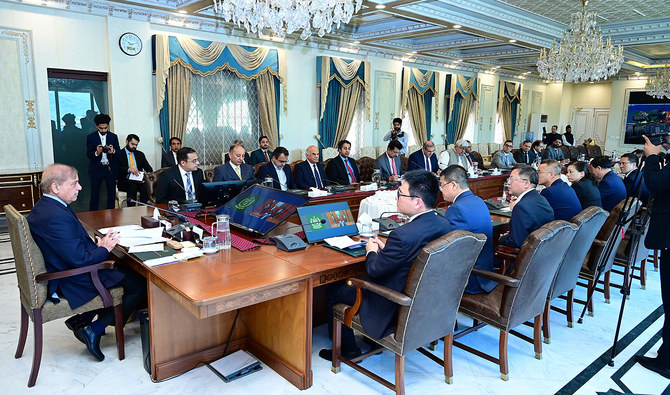
- A deadly suicide bombing last month in northwestern Pakistan left five Chinese citizens dead
- PM Sharif meets Shanghai Electric delegation, assures Chinese investors would be facilitated
ISLAMABAD: Pakistan’s government will make “no compromise” on the security of Chinese workers in the country, Prime Minister Shehbaz Sharif said on Wednesday, as the South Asian country grapples with militancy that has often resulted in attacks on foreigners.
A suicide bomber last month rammed his vehicle into a convoy of Chinese engineers working on a hydropower project at the northwestern Dasu town in Pakistan. Five Chinese engineers and their Pakistani driver were killed in the attack.
The attack was the third major one in a little over a week on China’s interests in the South Asian nation, where Beijing has invested over $65 billion in energy, infrastructure and other projects as part of its wider Belt and Road initiative.
Following the attack, Pakistan’s government said it has taken steps to enhance Chinese citizens’ security in the country.
“Prime Minister Muhammad Shehbaz Sharif on Wednesday assured that the government would make no compromise on the security of the Chinese workers in Pakistan,” the state-run Associated Press of Pakistan reported.
The premier was speaking to a delegation of the Shanghai Electric Group, APP said. Sharif told the delegation that the government would ensure all possible facilitation to Chinese investors to further expand ongoing projects between the two countries.
“Citing cordial and time-tested ties with China, Prime Minister Shehbaz said that Pakistan desired to further promote its friendly ties and strengthen economic partnership with the country,” the state-run media said.
Pakistan is home to an insurgency launched by ethnic Baloch separatists who seek secession from the central government in the country, blaming it for the inequitable division of natural resources in the southwestern Balochistan province. The government denies this.
Chinese interests in Balochistan have also been under attack primarily by the militants, who seek to push Beijing out of mineral-rich Balochistan.
Saudi FM’s visit to lead to investment worth billions of dollars in Pakistan — PM Sharif
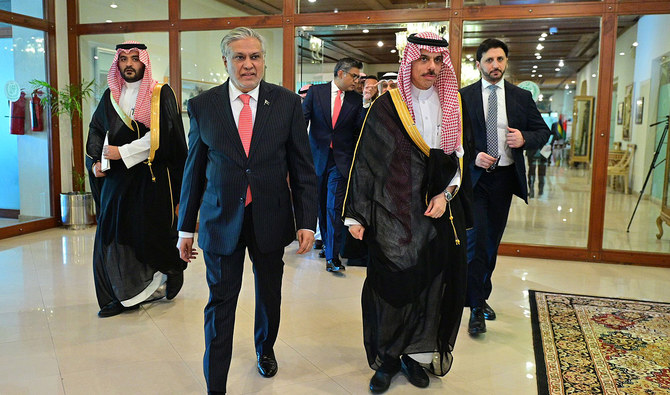
- Saudi foreign minister arrived in Pakistan on Monday for a two-day visit to discuss economic cooperation, investment deals
- Pakistan’s information minister describes Saudi FM’s visit as “positive,” says discussions on investment be implemented
ISLAMABAD: Prime Minister Shehbaz Sharif said on Wednesday that the recent visit of a high-powered Saudi delegation, led by the Kingdom’s foreign minister, will lead to investment worth billions of dollars to Pakistan, state-run media reported.
Prince Faisal arrived in Pakistan on Monday on a two-day visit aimed at enhancing bilateral economic cooperation and pushing forward previously agreed investment deals. His trip came a little over a week after Crown Prince Mohammed bin Salman met Prime Minister Shehbaz Sharif in Makkah and reaffirmed the Kingdom’s commitment to expedite investments worth $5 billion.
Pakistan and Saudi Arabia enjoy strong trade, defense and cultural ties. The Kingdom is home to over 2.7 million Pakistani expatriates and the top source of remittances to the cash-strapped South Asian country.
“Prime Minister Shehbaz Sharif has expressed the confidence that the visit of Saudi delegation will lead to investment worth billions of dollars in Pakistan,” Radio Pakistan said in a report.
The comments were made by Sharif during a meeting of the federal cabinet he chaired. Sharif thanked Saudi Crown Prince Mohammed bin Salman for the delegation’s visit and praised members of the Pakistani federal cabinet and authorities for making the visit a success.
Sharif stressed that the same dedication from officials was needed to ensure the arrival of the Saudi investment in Pakistan and the completion of the projects.
Separately, Information Minister Ataullah Tarar said the Saudi delegation had expressed “seriousness” about investing in Pakistan.
“Several matters were discussed with them regarding investments in refineries, natural resources and tourism sector, which are being implemented,” Tarar told reporters during a news conference.
“This was a very positive and successful visit.”
He said another high-level delegation from the Kingdom would visit Pakistan to sign important agreements and ensure these projects are implemented.
Tarar said another delegation of Saudi investors from the private sector would “soon” visit Pakistan. He said both Islamabad and Riyadh would play their role to facilitate the Saudi investors’ delegation’s visit.










